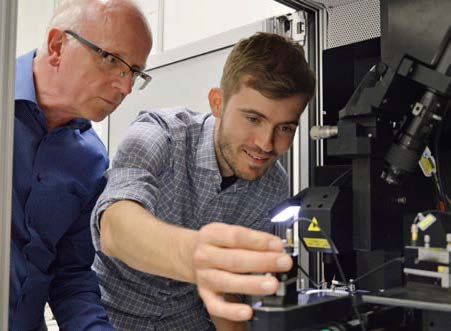Newly discovered material property of AlScN
Simon Fichtner from Fraunhofer ISIT made a pioneering discovery at Christian-Albrechts-Universität zu Kiel (CAU) last year: he was the first to be able to prove the presence of ferroelectricity in a III-V semiconductor-based material.
Piezoelectric materials generate electric voltages when they are deformed and, vice versa, they change their shape when an electric voltage is applied to them. They are used to convert motion into electrical signals or electrical signals into motion and are used, for example, in MEMS loudspeakers, MEMS microphones, or MEMS print heads. During his investigations on piezoelectric aluminum scandium nitride (AlScN), Simon Fichtner discovered that the spatial electrical orientation of the crystals of the III-V compound semiconductor can be switched when an electrical voltage is applied. Contrary to expectations, the material is thus ferroelectric. By superimposing multiple layers of AlScN without intermediate insulation, microdrives, for example, can be generated. These special microdrives are significantly more powerful than conventional piezoelectric drives. But ferroelectricity in AlScN also promises to widen the application potential of the material from MEMS to microelectronics, for instance by advancing groundbreaking concepts in the context of nonvolatile memory and power electronics.
In a project funded by the German Federal Ministry of Education and Research (BMBF) to the tune of €2.3 million, researchers from CAU Kiel are now working together with Fraunhofer ISIT and Fraunhofer IAF to investigate the extent to which this substantial discovery can be made technically useful. The four-year project focuses on two types of components: a chip loudspeaker and an innovative power transistor. To accelerate the transfer of scientific results into disruptive applications, industrial partners are also involved.
Last modified:
